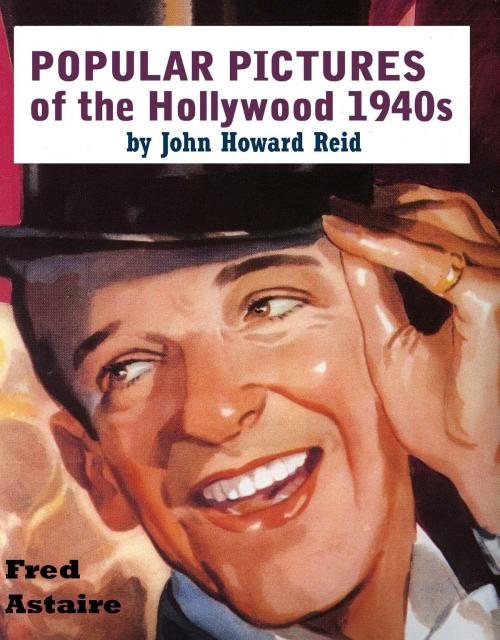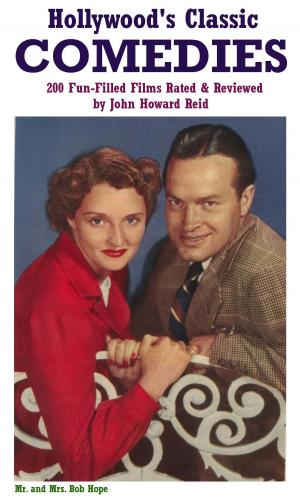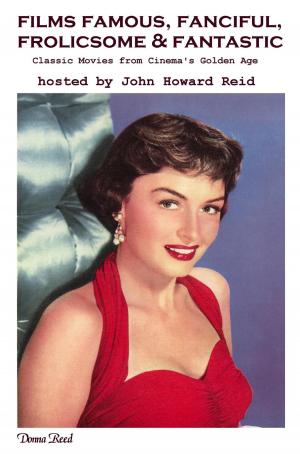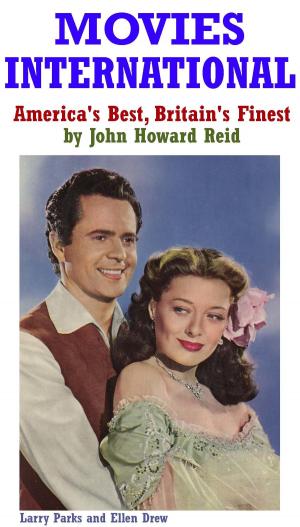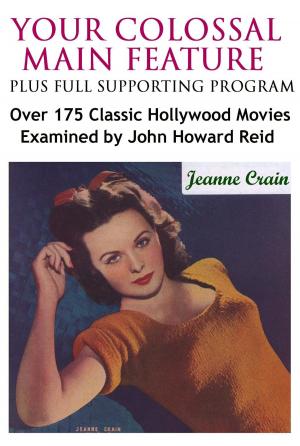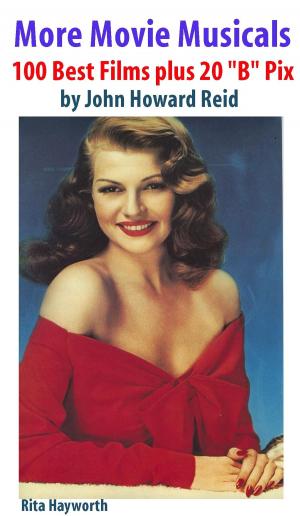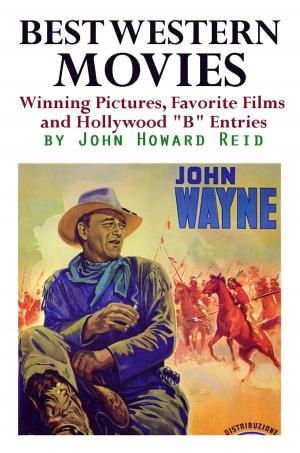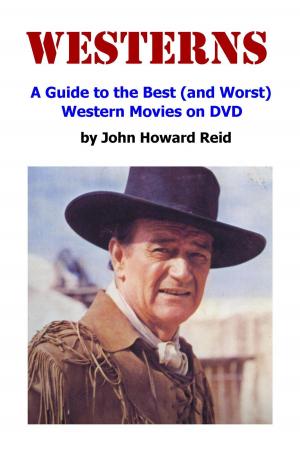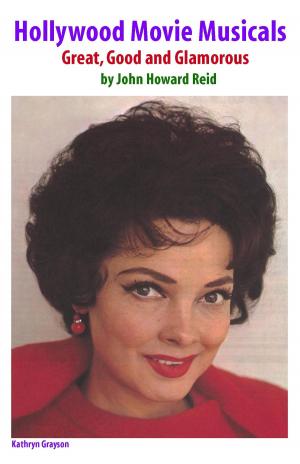POPULAR PICTURES of the Hollywood 1940s
Business & Finance, Industries & Professions, Industries, Nonfiction, Social & Cultural Studies, Social Science, Cultural Studies, Popular Culture| Author: | John Howard Reid | ISBN: | 9781458143860 |
| Publisher: | John Howard Reid | Publication: | March 29, 2011 |
| Imprint: | Smashwords Edition | Language: | English |
| Author: | John Howard Reid |
| ISBN: | 9781458143860 |
| Publisher: | John Howard Reid |
| Publication: | March 29, 2011 |
| Imprint: | Smashwords Edition |
| Language: | English |
Headed "Fascinating Tour of the 1940s for Movie Buffs", the following review by Maria Trefely-Deutch appeared in The Sunday Telegraph: John Howard Reid’s latest offering is every bit as idiosyncratic as his previous books in this series, and equally compulsive reading for film buffs. The present book provides a wealth of information. However, in his enthusiasm for the golden oldies, Reid does tend to go over the top with his prose. In his review of Captain Kidd, Charles Laughton is described as "hamming up the part with such lively gusto as to turn an almost featherless screenplay into a veritable feast of robust entertainment." Then again, no film commentator ever made his name by showing restraint. While all Reid’s reviews are entertaining and informative, some show exceptional insights… The following review by John Weyland was published in The West Australian: “POPULAR PICTURES of the Hollywood 1940s” is a minor masterpiece in the film book genre. Although the author finds much excellence in the films he has chosen, he is also not afraid to criticize harshly. Generally, however, Reid finds much to admire in the films he writes about. He is a full-fledged movie buff, but not a drooling one. His selections range from Son of Dracula ("a minor masterpiece of the 'B' Gothic cinema") to Tarzan Triumphs ("the climax in which Johnny Weissmuller taunts the Nazi before leading him to a gruesome death, has a prolonged, psychologically violent intensity rare in the kiddies' matinee movie"). All told, more than 150 films are featured in this surprising book. They all contain exhaustive information on credits, casts, box-office figures and release dates… Headed, "Much to entertain for the film buffs", this review by Peter Dean appeared in The Courier-Mail: This sixth book in the Hollywood Classics series is as pertinent, illuminating and controversial. For instance, many inoffensive and obliging actors are labeled dull. Walter Pidgeon, for one. The antipathy exhibited towards him in "Memorable Films of the Forties" is continued, even when he earns a left-handed compliment for his performance in "How Green Was My Valley", in which (while dull, of course) he was "brilliantly cast". On the other hand, Reid finds Spencer Tracy, Gene Lockhart, Claude Rains, Cedric Hardwicke, Raymond Massey, Norman Lloyd, Jack Carson, Bruce Bennett, Zachary Scott, Lionel Barrymore, John Garfield, Adolphe Menjou, David Niven, Dudley Digges, John Hodiak, Wendell Corey, Ronald Colman, William Benilliam Bendix and Noel Coward consistently pleasing. There’s little to argue about there. Proving gallantry isn't dead, Reid also expresses warm regards for a swag of actresses, including Dorothy Lamour, Ilona Massey, Marilyn Monroe, Barbara Stanwyck, Ann Blyth, Ginger Rogers, Jean Arthur, Doris Day, Katharine Hepburn and most particularly Alice Faye ("so electrifying") and the incomparable Ingrid Bergman, both of whom, in Reid's eyes, could do no wrong. In his review of "Keys of the Kingdom", Reid provides a most interesting section on how Hollywood used to pander to the vested interests of organized religion, particularly the Catholic Church. Reid describes the movie as a milksop version of A.J. Cronin’s novel in which "not a single one of his points or arguments are allowed even a shadow of expression on the screen". Yet Fox’s publicity department had the audacity to hail the novel as "one of the most excitingly discussed books of our times!" even though every single reference, word or incident that excited discussion had been scrupulously removed from the film by executive producer, Darryl F. Zanuck. This review of "Keys of the Kingdom" is film criticism at its best. Indeed there is much to savor and respect in this book. John Howard Reid speaks his mind intelligently and entertainingly. Even if you don’t always agree with him, your outlook has been so stimulated that it may never be quite the same again.
Headed "Fascinating Tour of the 1940s for Movie Buffs", the following review by Maria Trefely-Deutch appeared in The Sunday Telegraph: John Howard Reid’s latest offering is every bit as idiosyncratic as his previous books in this series, and equally compulsive reading for film buffs. The present book provides a wealth of information. However, in his enthusiasm for the golden oldies, Reid does tend to go over the top with his prose. In his review of Captain Kidd, Charles Laughton is described as "hamming up the part with such lively gusto as to turn an almost featherless screenplay into a veritable feast of robust entertainment." Then again, no film commentator ever made his name by showing restraint. While all Reid’s reviews are entertaining and informative, some show exceptional insights… The following review by John Weyland was published in The West Australian: “POPULAR PICTURES of the Hollywood 1940s” is a minor masterpiece in the film book genre. Although the author finds much excellence in the films he has chosen, he is also not afraid to criticize harshly. Generally, however, Reid finds much to admire in the films he writes about. He is a full-fledged movie buff, but not a drooling one. His selections range from Son of Dracula ("a minor masterpiece of the 'B' Gothic cinema") to Tarzan Triumphs ("the climax in which Johnny Weissmuller taunts the Nazi before leading him to a gruesome death, has a prolonged, psychologically violent intensity rare in the kiddies' matinee movie"). All told, more than 150 films are featured in this surprising book. They all contain exhaustive information on credits, casts, box-office figures and release dates… Headed, "Much to entertain for the film buffs", this review by Peter Dean appeared in The Courier-Mail: This sixth book in the Hollywood Classics series is as pertinent, illuminating and controversial. For instance, many inoffensive and obliging actors are labeled dull. Walter Pidgeon, for one. The antipathy exhibited towards him in "Memorable Films of the Forties" is continued, even when he earns a left-handed compliment for his performance in "How Green Was My Valley", in which (while dull, of course) he was "brilliantly cast". On the other hand, Reid finds Spencer Tracy, Gene Lockhart, Claude Rains, Cedric Hardwicke, Raymond Massey, Norman Lloyd, Jack Carson, Bruce Bennett, Zachary Scott, Lionel Barrymore, John Garfield, Adolphe Menjou, David Niven, Dudley Digges, John Hodiak, Wendell Corey, Ronald Colman, William Benilliam Bendix and Noel Coward consistently pleasing. There’s little to argue about there. Proving gallantry isn't dead, Reid also expresses warm regards for a swag of actresses, including Dorothy Lamour, Ilona Massey, Marilyn Monroe, Barbara Stanwyck, Ann Blyth, Ginger Rogers, Jean Arthur, Doris Day, Katharine Hepburn and most particularly Alice Faye ("so electrifying") and the incomparable Ingrid Bergman, both of whom, in Reid's eyes, could do no wrong. In his review of "Keys of the Kingdom", Reid provides a most interesting section on how Hollywood used to pander to the vested interests of organized religion, particularly the Catholic Church. Reid describes the movie as a milksop version of A.J. Cronin’s novel in which "not a single one of his points or arguments are allowed even a shadow of expression on the screen". Yet Fox’s publicity department had the audacity to hail the novel as "one of the most excitingly discussed books of our times!" even though every single reference, word or incident that excited discussion had been scrupulously removed from the film by executive producer, Darryl F. Zanuck. This review of "Keys of the Kingdom" is film criticism at its best. Indeed there is much to savor and respect in this book. John Howard Reid speaks his mind intelligently and entertainingly. Even if you don’t always agree with him, your outlook has been so stimulated that it may never be quite the same again.
